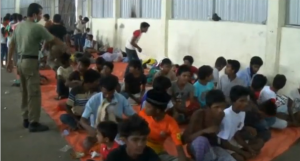
MAY 16 (Reuters) — Indonesian authorities were busy on Saturday (May 16) morning, providing food to the hundreds of Rohingya and Bangladeshi migrants who were brought to shore by local fishermen during the previous day from their boat which was drifting off the coast.
The nearly 800 migrants who arrived on Friday (May 15) are being sheltered in a warehouse in Langsa, off the coast of Sumatra island. Another 100 who were rescued on Friday are now at Pangkalan Susu, while a further 600 are being housed in a shelter in Lhoksukun, where they have been since arriving in Indonesia on May 10. A thousand migrants have also made their way to Malaysia’s Langkawi island.
One migrant at Langsa said he wanted to go to Malaysia.
“I don’t know Aceh really I don’t know Aceh, I only want to go to Malaysia after we failed and floating in sea there are Aceh fishermen who help us,” said Muhammad Rofiq, a migrant from Myanmar said.
Aceh is just across the Malacca Strait from Thailand and Malaysia.
Many elements of the journey of the migrants to Indonesia are unclear, but many were found starving and ill when brought ashore after floating for a long period in the ocean on the rickety ship with little food and clean water. Medical staff said many were suffering from dehydration and shock.
Indonesian officials said 25 of those rescued on Friday were taken to a nearby hospital. Another 300 were treated in tents set up near the temporary shelter for less serious medical issues.
The United Nations this week urged governments to fulfil an obligation to rescue those at sea and keep their borders and ports open to help vulnerable people who are in need.
However, there have been few signs that Southeast Asian nations are collaborating to avert a humanitarian crisis, in contrast with Europe, where countries are working together to deal with a tide of migrants crossing the Mediterranean.
The United States last year downgraded Thailand and Malaysia to its list of the world’s worst centers of human trafficking, dumping them in the same category as North Korea and Syria.
The White House also urged Southeast Asian nations on Friday to work together to save lives of Rohingya migrants who have been adrift at sea since leaving Myanmar, according to a statement.







